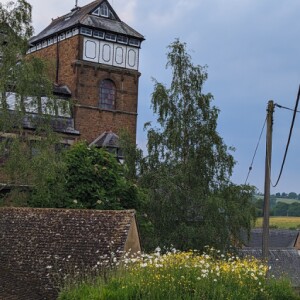A Time for Every Purpose
The shed roof is having a moment. I took this from ground level looking up, after the sky had darkened and we had actually had a moment of two of rain, which merely flattered to deceive, bringing no real benefit. I have never seen the roof quite so rampant. It's got a primitive drop-irrigation system, of course, or it would be scorched brown by now. The combination of water, cool nights and warm bright days has created a mini-jungle
The extra shows it in context. You would not believe how hard it is to take this picture. Only one house window on the first floor looks out roughly in this direction. Even then, to take the picture, I have to slip my hands individually through the narrow space behind the open window (it hinges part-way from the edge), hold the phone between thumb and forefinger - pointing along the wall, then take the picture by prodding, semi-sighted with the index finger of the other hand. To line up the shot, I'm looking at the screen through the glass of the open window - my head leaning out of the house on one side and my two hands on the other
In the apiary, we revisited the swarming colony from yesterday, to split it into two hives. Of course, the queen who was completely invisible yesterday was today out on full display today, grinning from antenna to antenna. No matter, we did not change our approach. A large colony has now been divided into two - one half with the queen and flying bees, but very little brood; the other half with most of the brood and nurse bees to look after it, but few flying bees. Neither half should feel confident enough to swarm, when they are missing some of the components of a complete, well-balanced colony
You will notice that I'm referring to'flying bees' and 'nurse bees', almost as if they are different castes from queen, drones and workers. That is not really how it works. Each individual worker actually fulfills a succession of colony roles throughout her life, beginning with cleaning out empty brood cells, moving on to nursing the queen and brood, doing a stint of wax making and comb building, perhaps then receiving nectar from returning foragers and storing it in the comb, maybe followed by guarding the entrance
The final role is that of forager, putting in the hard miles of flying, wings becoming ragged until, worn out, one day (at about 6 weeks old, in summer) they do not make it back to the hive. Physiological changes to the workers body and body chemistry go along with these changing roles, as different organs and glands develop and decline over time
Everything has its moment


Comments
Sign in or get an account to comment.


